The Shape of Global Governance
As the world gets smaller, regulation increasingly takes form beyond the state level through international bodies such as the United Nations, World Trade Organization, and European Union. Last spring, the Law School magazine invited a dozen leading international legal scholars, political scientists, and philosophers, all of whom are on the NYU Law faculty or were inaugural visiting fellows of the Straus Institute for the Advanced Study of Law & Justice, to make sense of this new order. They discussed how to define global governance, how rule of law factors in, how to measure success, and,at its most basic, what to call the whole system. José Alvarez, Herbert and Rose Rubin Professor of International Law, agreed to moderate the deep and provocative discussion that ensued. An edited and condensed version follows.
Printer Friendly Version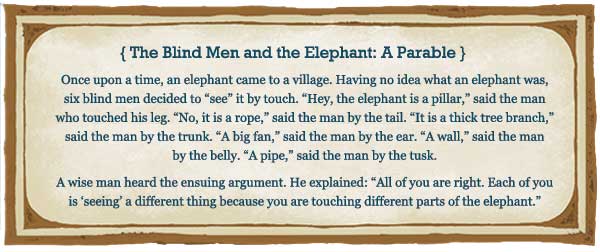
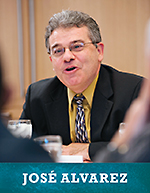 JOSÉ ALVAREZ: Many of us look at different institutions, formal and informal, from a variety of perspectives, including political science, anthropology, and law. We use different terminology to describe what global governance is. Some of us see “global administrative law,” some describe “regime complexes,” others the “constitutionalization” of the world or the spread of “the rule of law,” “judicial empowerment,” or “judicialization.” Are these different parts of the elephant? Does the label we choose influence how we see that elephant? Are the labels important?
JOSÉ ALVAREZ: Many of us look at different institutions, formal and informal, from a variety of perspectives, including political science, anthropology, and law. We use different terminology to describe what global governance is. Some of us see “global administrative law,” some describe “regime complexes,” others the “constitutionalization” of the world or the spread of “the rule of law,” “judicial empowerment,” or “judicialization.” Are these different parts of the elephant? Does the label we choose influence how we see that elephant? Are the labels important?
 JAN KLABBERS, Professor of International Organizations Law, Helsinki University: There is definitely something more going on than just describing different parts of the elephant. A label such as constitutionalization carries with it a sense of legitimacy, a sense of rights protection, which would not be as evident if you describe things as a regime complex, or as legalization or judicialization. The label would definitely indicate a certain way one would normatively think we might be heading, or ought to be heading.
JAN KLABBERS, Professor of International Organizations Law, Helsinki University: There is definitely something more going on than just describing different parts of the elephant. A label such as constitutionalization carries with it a sense of legitimacy, a sense of rights protection, which would not be as evident if you describe things as a regime complex, or as legalization or judicialization. The label would definitely indicate a certain way one would normatively think we might be heading, or ought to be heading.
ALVAREZ: So part of it is prescriptive.
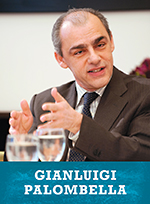
GIANLUIGI PALOMBELLA, Professor of Legal Philosophy and Sociology of Law, University of Parma: There is an epistemic value and pragmatic consequences behind description. Global administrative law (GAL), for example, as a paradigm of global governance, rejects substantive organizing constructions but enhances the legal side: It does see a transborders reconnecting structure of law. This is a very effective view that aims at managing global governance in a certain way. While global governance works through the double move of narrowing to specialized areas and extending control over the globe, the legal account tends to configure a new overarching legality (like GAL), equating it with a homogenizing global law. These theoretical frames have pragmatic consequences.
ALVAREZ: So there’s description, prescription, differing specializations, and perhaps methods to exert control in our labels. So that when we say we’re “governing the world,” that in itself suggests what we aspire to accomplish?
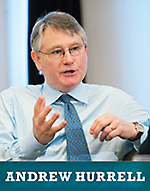 ANDREW HURRELL, Montague Burton Professor of International Relations and Fellow, Balliol College, Oxford University: In a sense, all labels are arbitrary. What’s important is the way in which whatever label we use actually connects with the different parts of the elephant. After all, there is an elephant, and it’s large, lumbering, and dangerous. And people and societies get affected, often negatively, by that elephant that we call global governance.
ANDREW HURRELL, Montague Burton Professor of International Relations and Fellow, Balliol College, Oxford University: In a sense, all labels are arbitrary. What’s important is the way in which whatever label we use actually connects with the different parts of the elephant. After all, there is an elephant, and it’s large, lumbering, and dangerous. And people and societies get affected, often negatively, by that elephant that we call global governance.
One of the very powerful ways that many people have tried to capture the idea of global governance, particularly in the 1990s, was to adopt a rather narrow view, to see it essentially in terms of finding effective, efficient solutions to a set of well-understood, shared global problems. But the risk is that this displaces two other crucial issues.
One is the issue of values: Whose values are being included in the solutions to these apparently shared problems? And the other is power: How are these different clusters of regimes, rules, and institutions connected to power structures? This problem is particularly evident in periods when power is shifting and changing, because any legal regulatory administrative structure has to be connected to the realities of how power is changing and has to be compatible with the interests and values of the powerful states that are emerging in the system. And we are living through a period where power is shifting—away from the established core of the old G-7 and toward a new group of emerging regional and global powers.
ALVAREZ: So our labels partly describe reality and are partly aspirational—“if you build it, they will come”—and it will reflect reality.

ROBERT KEOHANE, Professor of International Affairs, Princeton University: Let’s go back to the first question: Why do we have so many labels for global governance? I come to this as a political scientist. Basically what it comes down to is that this is a highly variable phenomenon. It’s not one elephant; it’s a herd of elephants. One way to think about this descriptively is to think about dimensions along which global governance varies. I want to mention three: 1. Legalization. Some local governance takes place with informal practices that are not legalized. Others take place with a very legalized structure—WTO, for example—with dispute settlement arrangements, opinions that are argued out and published. 2. Comprehensiveness. The attempt of the UNFCCC, the framework convention on climate change, to have a comprehensive climate regime, in my view, has failed, and we’re seeing a very different, less comprehensive regime, a set of specific regimes. And, 3. How integrated or fragmented the pattern is. If we mapped out the local governance, we’d find lots of examples on all three of these dimensions. It becomes hard to generalize until we have a clear notion of what we’re talking about. For example, the WTO is as close as we get to a legalized, comprehensive regime. The migration regime is an example of a nonlegalized, informal, fragmented regime.
 JOSEPH WEILER, University Professor and Director, Straus Institute for the Advanced Study of Law & Justice, NYU School of Law: I would bet that you can open any book on the law of the WTO and the word “governance” would not be in it. So if you look at your standard international law book, you will still find it working within the paradigm that international law is a way that states negotiate, try to vindicate their national interest and rules to contain their national interest, or to harmonize with the national interest of others. Even the most progressive communitarian view of international law would still privilege (a) states and (b) this notion of sovereign equals with different volitions trying to make the world a better place. Using a vocabulary of governance much better describes what’s happening in the international arena. Before, the main normative sensitivity was consent or nonconsent by states. Now there’s a much broader set of both efficiency questions and normative questions of legitimacy. In the former, for instance, where governance exists, we will want efficient governance for the management of resources and also the achievement of objectives. There’s a huge payoff if you go to any doctrinal area of international law, whether it’s state responsibility, the use of force, international, environmental, or the law of the sea, and look at it through the spectacle of global governance. Is there global governance here? How does it affect global governance? Global governance is a sensibility employed like a prism. It’s a coloring agent that suddenly illuminates phenomena that, under the normal spectacle of international law, you didn’t see.
JOSEPH WEILER, University Professor and Director, Straus Institute for the Advanced Study of Law & Justice, NYU School of Law: I would bet that you can open any book on the law of the WTO and the word “governance” would not be in it. So if you look at your standard international law book, you will still find it working within the paradigm that international law is a way that states negotiate, try to vindicate their national interest and rules to contain their national interest, or to harmonize with the national interest of others. Even the most progressive communitarian view of international law would still privilege (a) states and (b) this notion of sovereign equals with different volitions trying to make the world a better place. Using a vocabulary of governance much better describes what’s happening in the international arena. Before, the main normative sensitivity was consent or nonconsent by states. Now there’s a much broader set of both efficiency questions and normative questions of legitimacy. In the former, for instance, where governance exists, we will want efficient governance for the management of resources and also the achievement of objectives. There’s a huge payoff if you go to any doctrinal area of international law, whether it’s state responsibility, the use of force, international, environmental, or the law of the sea, and look at it through the spectacle of global governance. Is there global governance here? How does it affect global governance? Global governance is a sensibility employed like a prism. It’s a coloring agent that suddenly illuminates phenomena that, under the normal spectacle of international law, you didn’t see.
 RICHARD STEWART, University Professor and Chair and Faculty Director, Hauser Global Law School Program, NYU School of Law: The sensibility of governance frees us from the distorted perspectives of traditional legal categories. But then we have to reconstruct the field, because governance is such an amorphous set of phenomena. Reconstruction is necessary to understand it and set at least an implicit normative agenda. And then the question is, Do each of us just retool his or her own particular discipline? Or are there other crosscutting pathways conceptually and normatively?
RICHARD STEWART, University Professor and Chair and Faculty Director, Hauser Global Law School Program, NYU School of Law: The sensibility of governance frees us from the distorted perspectives of traditional legal categories. But then we have to reconstruct the field, because governance is such an amorphous set of phenomena. Reconstruction is necessary to understand it and set at least an implicit normative agenda. And then the question is, Do each of us just retool his or her own particular discipline? Or are there other crosscutting pathways conceptually and normatively?
 KEVIN DAVIS, Beller Family Professor of Business Law, NYU School of Law: I want to resist the implication that there’s been this evolutionary progress. The concept of governance misses certain aspects of the phenomenon that are of particular interest to me—typically, the ones that involve more decentralized forms of cooperation. When I think of governance, I think of the relationship between the governors and the governed. It’s difficult for me to fit in things like private contracting, like the terms of credit default swaps on sovereign debt and their impact on behavior, into the concept of governance. That activity is not necessarily being dictated by any sort of governing authority. It is a form of normativity that is structuring international activity, international capital flows, and so forth, and I am not sure that using the term “governance” or a governance lens, is going to allow us to analyze that particular phenomenon in all its different facets. I caution against the idea that now that we’ve discovered the role of governance in international affairs, we’ve arrived at the sort of intellectual nirvana where this is the best model, because it’s not necessarily so obvious to me.
KEVIN DAVIS, Beller Family Professor of Business Law, NYU School of Law: I want to resist the implication that there’s been this evolutionary progress. The concept of governance misses certain aspects of the phenomenon that are of particular interest to me—typically, the ones that involve more decentralized forms of cooperation. When I think of governance, I think of the relationship between the governors and the governed. It’s difficult for me to fit in things like private contracting, like the terms of credit default swaps on sovereign debt and their impact on behavior, into the concept of governance. That activity is not necessarily being dictated by any sort of governing authority. It is a form of normativity that is structuring international activity, international capital flows, and so forth, and I am not sure that using the term “governance” or a governance lens, is going to allow us to analyze that particular phenomenon in all its different facets. I caution against the idea that now that we’ve discovered the role of governance in international affairs, we’ve arrived at the sort of intellectual nirvana where this is the best model, because it’s not necessarily so obvious to me.
 SALLY MERRY, Professor of Anthropology, Law and Society, New York University: I’ve always found it interesting to look at how international law works in practice—the kinds of social relationships, networks, and sets of understanding that shape international law in process. The term “governance” moves us in that direction. But it’s also important to recognize that there are social relationships, informal organizations, networks of people that are now transnational that do a lot of the work of actually making international law activities relevant to populations and countries. There are important dimensions of shared cultural understandings that exist in a variety of the institutions of cosmopolitan consciousness. What we see emerging are various populations that think of themselves in more or less cosmopolitan ways. Certainly in the field of human rights, human rights compliance is going to depend on average people who think of themselves in terms of possessing human rights, which means in some sense they think of themselves as global citizens. How those social/cultural changes happen is enormously important for thinking about how international law works. It’s a dimension—if we shift from law to governance—that we need to keep in place, both the social networks and the cultural dimensions of what this might mean and how it goes about reshaping the world.
SALLY MERRY, Professor of Anthropology, Law and Society, New York University: I’ve always found it interesting to look at how international law works in practice—the kinds of social relationships, networks, and sets of understanding that shape international law in process. The term “governance” moves us in that direction. But it’s also important to recognize that there are social relationships, informal organizations, networks of people that are now transnational that do a lot of the work of actually making international law activities relevant to populations and countries. There are important dimensions of shared cultural understandings that exist in a variety of the institutions of cosmopolitan consciousness. What we see emerging are various populations that think of themselves in more or less cosmopolitan ways. Certainly in the field of human rights, human rights compliance is going to depend on average people who think of themselves in terms of possessing human rights, which means in some sense they think of themselves as global citizens. How those social/cultural changes happen is enormously important for thinking about how international law works. It’s a dimension—if we shift from law to governance—that we need to keep in place, both the social networks and the cultural dimensions of what this might mean and how it goes about reshaping the world.
ALVAREZ: Does the WTO create this consciousness? Or is it the other way around?
MERRY: It goes both ways. As the consciousness emerges, it feeds into these institutions, which otherwise are fairly irrelevant to the local population, and the institutions themselves begin to shape what are essentially local normative orders that may be law or law lite. We live in a world of plural legal systems; some are international or domestic, and some are very informal social-group based. Each one shapes the other in a somewhat semiautonomous way. But they’re very unequal in power. This is an important dimension of them. Looking at the complexity of these different regulatory structures and how they shape each other is really essential to understanding how this international law system works as a social system.
ALVAREZ: Does anybody other than Joseph think there’s something to the progress narrative that international lawyers talk about? The suggestion is that international law and governance are better for the world. This is at the heart of constitutional talk, rule of law talk, judicialization talk….
WEILER: Wait a minute—I never put any normative value on it. The only progress was an epistemic progress, to realize that it’s not that we once were in the Wood Age, and then the Copper Age, the Bronze Age, and then the Steel Age, but that these things coexist.
So in terms of legal norms, international law simultaneously has to be understood as having some constitutional, legislative, and administrative norms. Also governance norms. If we don’t use that concept in trying to explain the complexity which is the international legal system, we are missing out on something very important.
KEOHANE: The progress issue would be a whole discussion in itself. I want to point to two changes in the last 20 years that I certainly didn’t expect. The common wisdom in political science in the 1980s was that GATT was not legalized, and that was because of the structure of power and the nature of the interest involved. It was quite a surprise when WTO was as legalized as it was.
The other change is the development of a shared understanding that governance and government are different. Governance, as it’s used by political scientists, does not imply the kind of hierarchy that government implies. That distinction is important because you don’t have a lot of hierarchy in world politics. You have a lot of reciprocal relationships, a lot of activity by non-state actors; you have the kind of contracting you talk about.
PALOMBELLA: The question of governance has different layers itself. But the problem now has shifted from government vis-à-vis governance to legality vis-à-vis governance. We do not even dare to have a global government, but we try to develop “legality.” Now, as a connected issue, the aspiration to legally “cover” or tame global governance somehow might overlook the persistent multiplicity, diversity in shapes and social embeddedness of different orders, and legalities that overlap and compete on the surface of the globe. As Professor Merry said, we have many layers with very different raisons d’être. Their inevitable connection should not be taken as testament of legality as one-dimensional (if we have global administrative law, we also have inter gentes/interstates law, national law, transnational “merchant” law, regional law like the E.U., and so forth). Still, it is relevant that the legal dimension can prove to be promising in facing such complexity.
Medievalism is a “false friend,” but still we can learn something from it: The medieval environment was not controlled politically but through law, by diffusion of legalities, by legal science, development of legal scholarship. It was the only way to keep all the layers together. We are close to such a step in global governance.
 BENEDICT KINGSBURY, Murry and Ida Becker Professor of Law and Director, Institute for International Law and Justice, NYU School of Law: The idea of global governance can become hopelessly broad. One way for lawyers to tighten the concept to get some analytical purchase is to focus specifically on regulation, or regulatory governance.
BENEDICT KINGSBURY, Murry and Ida Becker Professor of Law and Director, Institute for International Law and Justice, NYU School of Law: The idea of global governance can become hopelessly broad. One way for lawyers to tighten the concept to get some analytical purchase is to focus specifically on regulation, or regulatory governance.
Global regulatory governance is, of course, highly political. It aims to affect conduct, including private conduct, and an ever-increasing volume of human interactions on important questions that people care strongly about. It has substantial effects on the distribution of resources. So the moral and normative stakes in global regulatory governance can be high. That applies to governance by both formal and very informal institutions.
In our view, this political enterprise also has important legal dimensions. The NYU Global Administrative Law Project focuses principally on situations where regulatory power is being exercised beyond the state, whether by states or intergovernmental organizations or partially or wholly private actors. Not all of the regulation we study is explicit. Behavior might be regulatory in the sense that there’s an absence of regulation there deliberately, to serve the interests of some particular groups, or perhaps with the normative aim of letting people flourish free of formal regulation.
Regulatory power in transnational governance is often wielded by a complex combination of actors addressing a myriad of different activities, and without a single directing mind. The interplay among regulatory actors and activities often does not correspond to any single act of will. There are sometimes irrationalities, arbitrage opportunities, curious gaps, etc. But we can still think of those situations as regulation.
In all of these regulatory situations, we must start to think: How should that power be structured? What should be its principles of transparency? Who should be participating there? Should there be accountability? Should there be review? Could or should the structure be set up more hierarchically?
The legal global governance perspective brings at least two important features that have been missing from more traditional international law approaches. First: the dynamic effects of regulation. Rather than somebody primarily asking, “Well, what is the law? How does it work? What is the function of this institution?” we urge that scholars, and our students, also ask: “What are the incentives on all the actors? How do players reposition? How do they start to think differently? How does it reconfigure power around those things? How does it reconfigure normative expectations and the language in which an issue is debated in terms of justice?” Second: attention on the effort of regulation to motivate private actors. Legally grounded regulation is not simply a matter of the structure or formal international regulatory power and its application to states; it aims also to incentivize action by a lot of other players. There are thus likely to be unexpected shifts of behavior, leading to further regulatory actions or problems. There are also likely to be counteractions: counter-power mobilized against whatever precise regulation is taking place, by those who contest it.
STEWART: Gianluigi asked how can we bring law to global governance? Rather than elaborating the structure of law within a relatively closed institutional system, globally we face a much more open universe of communication, including normative interaction. It is very plastic.
How does law catch up with globalization? And should it try to? How far should global governance be “legalized”? Global administrative law does not aspire to provide a comprehensive answer to the questions of law’s role in global governance. We focus on the procedures and mechanisms for review of global regulatory administrative decision making. We are witnessing the rapid growth of global regulation, as Benedict has articulated, and we see that much of that regulation is administrative in character. Accordingly, we ask questions about the role of administrative law mechanisms in promoting accountability and responsiveness by the global administrative decision makers.
We are aware of the drawbacks of this focus. If you don’t look at all the systemic effects and have more inclusive goals, maybe you’re not making progress. Our strategy is to examine the role of some elements of law as applied to critical subsets of the global governance phenomenon.
MERRY: There are multiple ways that law can be brought into focus as part of governance, which doesn’t involve just asking about whether it’s compliant.
With law, it could be seen as standard setting, as producing cultural shifts, as a political resource. If we look at human rights, the enforcement mechanisms are relatively weak, and yet there are ways that those laws are actually culturally important in terms of determining standards by which people judge behavior. They gather resources, and they provide political mobilization strategies for actors in various places.
ALVAREZ: Beth, how does compliance play into this question of whether governance exists or not?
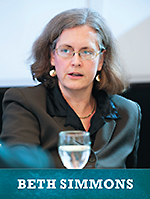 BETH SIMMONS, Clarence Dillon Professor of International Affairs, Harvard University: One of the most fruitful ways to answer is to think about the way that international standards and norms strike a chord in domestic conversations. And, how they further the interests of certain groups and start to help them see themselves in different ways.
BETH SIMMONS, Clarence Dillon Professor of International Affairs, Harvard University: One of the most fruitful ways to answer is to think about the way that international standards and norms strike a chord in domestic conversations. And, how they further the interests of certain groups and start to help them see themselves in different ways.
The extent to which the international legal norms and international laws become very useful in domestic conversations and contestations, and create a power resource in many cases, is an area in which power for some of these groups is very hard to come by. And it’s just about the only thing that they have to try to grasp.
One of the very interesting questions is the way in which international norms diffuse to the domestic level, whether that is by persuasion, by group activation, or by changing the incentives. For example, whether litigation, or the fear of litigation, transnationally can create incentives to look over domestic processes, to handle investment disputes.
KINGSBURY: Can you say something about your empirical work on human rights in this area?
SIMMONS: I did some quantitative and qualitative work. I found that when states read international treaties, there are actually three kinds of consequences. One is that it can change domestic agendas. So issues that might not have even been on the table in certain countries, by virtue of their exogenous introduction from the outside, get introduced. The second is that in domestic contexts, international treaties when they’re ratified, and under certain circumstances, can be used as very specific legal resources in actual litigation. That has helped to feed into the third mechanism: social mobilization. There’s a very strong relationship between those two things, where litigation can support and stimulate social mobilization and social groups, very consciously, when it seems like the right strategy in a particular cultural context, decide that litigation would actually strengthen their mobilization efforts.
What I find is that when states ratify agreements, these consequences in the aggregate lead to changes in some indicators we might care about with respect to human rights.
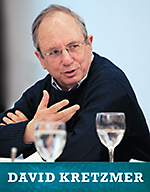 DAVID KRETZMER, Professor Emeritus of International Law, Hebrew University: How do human rights fit into this whole notion of global governance? You have to distinguish three issues. First, take the institutions, created by treaties between states, that are operating on the international level, such as the Human Rights Committee: What are the rules that apply to them? How are they supposed to act in new situations?
DAVID KRETZMER, Professor Emeritus of International Law, Hebrew University: How do human rights fit into this whole notion of global governance? You have to distinguish three issues. First, take the institutions, created by treaties between states, that are operating on the international level, such as the Human Rights Committee: What are the rules that apply to them? How are they supposed to act in new situations?
Next, what is the place of human rights in the actions of global actors that are not ostensibly connected with human rights—the WTO, E.U., and IMF? What human rights constraints apply to them? The third issue is the general way that we perceive human rights. We are trying to have an influence on state compliance with norms that have been laid down internationally, and the whole mechanism here is geared toward closing the deficiency gap between the international norms and the way states act in actual practice.
The questions that Sally Merry and Beth Simmons have asked are the most fundamental questions because lawyers have often made the simplistic assumption that if you only have these norms, everything is going to change and people are going to comply. The relationship is much more complex. How does this monitoring function, and can it really contribute to promoting compliance? Look at the tremendous changes that have taken place in the very perception of the HRC, of its role over the years, perceiving its role originally as part of friendly relations between states, which implies that we must not rock the boat too much and not criticize each other.
ALVAREZ: Do you have a tentative working hypothesis about how or why this mission creep with the human rights committees happened? Is it just the product of bureaucratization, or is it due to pressure from social movements?
KRETZMER: In the human rights field, treaties are a mechanism for lawmaking and not for regulating the relations or the interests of states. States may have some kind of concern about whether other states comply with their obligations. However, persons in one country are generally not going to be affected if the government of another country violates its obligations or the rights of its citizens.
When discussing how to monitor compliance with human rights treaties, there was a debate. Are we going to have monitoring by political bodies? Or are we going to have some kind of professional monitoring? The states opted in this case for a professional monitoring body. But at the time of the Cold War, you could have independent professional monitoring by people who were elected from the non-communist countries. There was no such thing when HRC members came from the communist countries; they were all political nominees of the state parties involved, and in the HRC they were plugging the interests of their states.
This eventually broke down when the Cold War ended. But the HRC was left with some of the rhetoric that had been adopted during the Cold War, like the notion of constructive dialogue, which reflected the idea that the object of the monitoring process was to promote friendly relations amongst nations. The HRC continued using the rhetoric of constructive dialogue without ever having considered what the term meant once the Cold War was over and its constraints on the committee’s work were removed.
KEOHANE: If there has been progress in the last 20 years, it’s been intellectual progress in the convergence between political science and law. When I was in graduate school a very long time ago, there were two sides of this issue. Many political scientists scorned international law, because of the ridiculous claims that were sometimes made.
To use the phrase by Andrew Jackson at the Battle of New Orleans, international lawyers have lowered their sights and achieved much. You’re doing global administrative law, which is very different from saying that world peace comes through world law. So the claims have come down to a point where they’re much more reasonable.
And second, we political scientists find ourselves like Molière’s bourgeois gentleman who’s speaking prose without knowing it, and I’ve been told this for 25 years. We talk about accountability and about diffuse reciprocity. So we are speaking in terms familiar to legal scholars while using different terms. And so it seems to me that this convergence came partly because the world changed; we see much more legalization. And it helped that international legal scholars lowered their sights a little bit and became more realistic politically.
WEILER: There is a payoff when we think of governance as part of political science, of social science, explaining why things happen in the way they do. What are the incentives? What are the disincentives? But there’s also a payoff in terms of political theory. One of the blind spots of law in general, and international and constitutional law in particular, is a certain fixation on rights.
And one of the most important developments in international law in the last half-century is this tremendous interest, both in theory and in practice, in instruments that protect rights. So there are multiple instruments and they protect multiple rights in different regimes, and the mechanisms for protection, and the monitoring have increased. A good world is a world where everybody’s rights are effectively protected.
But obscured is the fact that despite all this development and progress, individuals are still treated as objects. In the political theory of the state, the individual is very much a subject. He determines the outcome of elections. There is a very different understanding of the role of the individual in international law. So the first payoff of a governance perspective is that it draws upon certain aspects of political theory that highlight a different view of the individual, not simply as a recipient of rights, the way I protect my children, but as subjects entitled to powers. This perspective encourages us to see the power deficiencies of individuals. The lens of global administrative law highlights this phenomenon because the stakeholders of international legal governance grow both wider and deeper, and yet the individual is often not more than an object.
And the second payoff of a governance perspective is that it allows us to think: In what ways can the individual be empowered rather than be granted rights? Because once again, the notion of responsibility in international law is exclusively state responsibility. When there’s a violation of the law, it is states that are held to account.
So in humanitarian law, in the field of use of force, there can be some individualized responsibility. Within the theory of the political state, from which governance is borrowed, in some ways individuals are responsible-ized. If you elect a certain president and a certain party, there will be consequences to that. And you will bear the material consequences, the political consequences, and you as individuals will also bear the moral consequences.
No point in complaining about, “The government took us to war”—you voted for the government; you even voted them into power. There’s a much stronger notion that individuals are responsible for actions of the polity, in a way that is totally absent in international law. In the use of force, we never differentiate between the state that went to war on the basis of democratic decision making and some dictator who took them to war. It’s only the state that is held responsible, and if there were crimes, we might individualize the responsibility.
But the actions of the individuals within a state are never responsible-ized. In some deep way, we don’t take democracy seriously in our thinking about international law. And governance sensitizes not only to the power gap in international legal discourse—it’s all about rights and not about power—but also to the responsibility gaps, where responsibility is only attached to states and not to individuals who comprise those states.
That’s a huge advance in our thinking. But it enriches not only our social science understanding of international law but also our theory of international law: what it is about, what it ought to be about, in discomforting ways.
KLABBERS: Part of the problem is a practical one: that international organizations by and large refuse to cooperate. They refuse to give access to their standard practice of solving responsibility problems, etc. So all those people who have been rapporteurs for the International Law Association or the International Law Commission have found the doors closed in their faces.
The deeper problem may well be that no matter what sort of deontological regime you create, whether it’s constitutionalization or global administrative law, whether you call it responsibility or accountability, it’ll always leave a few gaps, partly because rules never figure out their own application.
HURRELL: The conversation between political theory, political science, and international law is important here. It has been slow in developing, but this is now changing. Political theorists have often tended to focus rather narrowly on human rights and economic distribution, rather than on the politics of global governance. A lot of the normative discourse has been somewhat disconnected from the actual practices and embedded practices of global governance. The triangular conversation among political theory, explanatory political science, and international law is one of the areas that has been gathering pace as a conversation.
WEILER: In developing the political theory of global governance, there might be some places where the global administrative law movement is ahead of political science, because they’re thinking seriously about these kinds of normative evaluations.
KEOHANE: We political scientists are still talking about accountability and legitimacy. And you’re providing some much more specific metrics and standards and procedures, which constitute and flesh out what it means to be accountable, and which might be the basis for legitimacy. You’re proceeding in a kind of parallel track along the same direction, but you’re getting more specific.
ALVAREZ: How do we criticize these institutions for what they do, and why?
MERRY: Actually, Kevin and Benedict and I have been working for a while on thinking about what role the construction of indicators as a form of knowledge has in processes of global governance. And as we look around at global governance decisions, they increasingly rely on these systems of numerical representations, often of countries—human rights violations, social economic factors—that produce rankings that provide a kind of simplified knowledge base, which producers recognize are a simplified knowledge base, but on which decisions may be made and public opinion constructed. The questions really are about how these forms of knowledge are produced, what kinds of information are included and what are not included, and how this may be affecting the way we understand the world and specifically how global governance works.
My concern about this developing technology has to do with the kinds of knowledge that get included and the kinds that are by definition not included in the need to produce commensurable categories across a wide variety of social situations and contexts. Representing a country by a number is clearly difficult. There is kind of an inexorable move toward doing this, which came from phenomena that were more readily measured, in the sphere of economics, to other areas that are much more difficult to measure in the field of governance—like rule of law and human rights compliance efforts. Here, there are issues about where the data comes from, who’s measuring it, and who’s counting, as well as more complicated questions about how these specific pieces of data collected in particular contexts get put together and constructed as this simplified representation.
Now, despite my concerns about this process, the creation of numerical measures and ranks is both a mechanism of governance and also a fundamental mechanism of reform these days. So social movements that are trying to produce reforms will also develop indicators. Another example is the U.N.’s Millennium Development Goals, which include indicators and are a way of raising awareness of the problem. Providing reports about “this many people are starving or in poverty” or “this many women are battered” offers a mode of reform. At the same time, it is also a mechanism for producing knowledge about populations to govern them. So the use of indicators for governance has this duality to it.
As indicators become more central to global governance in both ways, it is important to ask how this information is produced, how the data is collected, how it is used, how it is understood, and whether it is really producing a new basis for global decision making. Despite my concerns about what indicators actually represent, I recognize that this is a mode of power in the contemporary global world, that we probably cannot do without them.
ALVAREZ: So your project with Kevin is not to get rid of them but to improve them?
MERRY: My goal is to have users be more skeptical about them. Producers are quite skeptical about them. They know the limitations and the compromises they have to make to represent them to the general public—all the cautions and the worries and the compromises and the inadequate data that produced them tend to disappear. In the media these indicators get represented as facts. It’s the intersection between the indicators and the public and decision makers that is the area I am principally concerned with.
DAVIS: The first move for us is the conceptual one: simply to recognize these indicators as a form of, an exercise of, power. Recognizing that you don’t only govern through legal instruments and administrative directives and so forth, but also by producing information, including in this quantitative form that we’ve labeled “indicators.”
And then you can spin out the policy implications as well. Focusing on indicators gives us a new way of thinking about the role of law, for instance, in controlling the exercise of power, because once you’ve recognized that this is a technology of governance, you can start to think, Well, how should it be controlled? And in thinking about how to control that exercise of power, you can apply a global administrative law or regulatory framework.
For example, there might be procedural controls that you can place on the producers of the indicators, encouraging them to be more transparent about the methods of construction, involving more participation, more accountability, or having review mechanisms to validate their data, and so forth.
Or you can think about substantive norms that might be applied, particular standards of reliability that indicators might satisfy. Or structural interventions where you try to encourage the production of competing indicators to prevent one producer from gaining too much power.
There could also be education of the decision makers who are actually using some sort of World Bank indicator, for example, to decide how to allocate aid across countries. You can say, “Well, there are concerns here that you may not be recognizing in your current practices.” So there is definitely space for more policy-oriented interventions.
PALOMBELLA: Often it happens that “rule of law” is used as a device to protect internally, say, U.S. democracy against international law, and the like. But there is some other sense, for the rule of law “outside,” that is, on the global governance dimension. On the globe, legalities can conflict and overlap like tectonic plates.
My hunch is that rule of law on this meta level deals with granting some equal standing between legalities, although of different extension and depth. Some kind of legal language develops through this meta rule of law in between legal orders. One can think, among many, of the European Court of Justice when contrasting Security Council resolutions by appealing to a rule of law that protects our fundamental rights and making clear that this should matter in the confrontations with other legal orders—international law included. There should be, and in part there is already, a kind of rule of law that contrasts asymmetries of power and fosters some communicative processes beyond pre-given, content-independent hierarchy or formal priority among legal orders.
ALVAREZ: Tom Franck would have called these “claims of justice.”
KINGSBURY: Our discussion today has not yet focused on the reality that a lot of the discussion of global governance has mainly a North Atlantic provenance and sensibility. Because of the experience of the E.U. and European projects, and of the U.S. and North American and transatlantic projects, there’s a lot of thinking in the North Atlantic world about how to organize power in these governance-different modalities, how to evaluate it, and what place law and legality have in it.
But global issues require a somewhat different way of thinking and talking, some different ideas and structures with wider appeal and in which the concerns of the whole world participate. All of us have struggled with how to think about ideas from China and India and other major cultures and polities with very sophisticated, different sets of ideas—and with how to think about extreme inequality.
The indicators project we have launched in the Institute for International Law and Justice shows this pattern very acutely. Almost all the major global indicators are produced in the developed countries. But the “indicated,” the countries who mainly have incentives and are mainly affected by this, are principally in the south. Of course, many indicators rate and rank all the countries, but the countries who are really pressed by these rankings to change, the countries who need the World Bank soft loans or the support of aid agencies, and who are most often criticized for this or that poor performance on some indicator, are mainly—although not always—the poor or middle-income countries, the non-producers of the indicators that measure them. Many of us around the table have tried to work on global governance issues with the perspective of partner institutions in different developing countries. But our conversation today has not yet quite brought out the basic tensions in applying North Atlantic experiences and sensibilities to truly global issues: the justice questions, the participation questions, the real voice questions, the issue of whether new concepts, new techniques, new language are going to have to be developed—and contested—alongside or in succession to the export of dominant models that all of us here are somewhat in the business of doing.
HURRELL: One needs to make a distinction between where influential academic work comes from and how it is used and becomes politicized. In the case of globalization, the debates and academic literature grew up faster outside of the U.S. because that’s where the people were who were more affected by it. Academically, though, many people simply didn’t pay much attention to the work that was being generated outside the U.S. until globalization hit the U.S., especially the negative impact.
I’ve done some crude little Google searches on when global governance as a term and idea starts to appear and in which places. Compared to globalization, it is quite recent. It has been developing fast in Europe, well before it hit other places. In the emerging world, there has been a big take-up in use in Latin America, a huge take-up in China, but rather little in India.
WEILER: You’re underestimating the cleavage in Europe between political science, international relations, and law. If you look at the French philosophers, at the French postmodernists, they get to European law through the U.S. So the Americans pick it up from France, integrate it into their legal work, and then it slowly migrates back into the legal work in Europe. Global governance is the same: It starts in Europe, it migrates to the legal work in some ways in the U.S., and now it’s slowly migrating back to the legal work in Europe.
HURRELL: In terms of politics, it has been visible. Think of all the work on global governance that’s come out of Germany and Scandinavia.
In terms of the Global South, one theme is obviously the counter-hegemonic side and the protest against existing global governance. The other part—that I’m particularly interested in—is the way in which big emerging states view these changing processes of global ordering. Here, the role of small groups of the major players is particularly important. Even quite integrated formal institutions, like the WTO, are still dominated by bargains amongst particular players and by small clubs of states. In terms of the emerging architecture of global governance, gaining access to these clubs and groupings has become particularly important for rising powers.
One of the dominant imperatives for big developing countries is to try and work out exactly where power is in these different groups, and to try and get in, reshape, and refashion these clubs, such as the G-20—not only for interest-based reasons but also because access matters for status, prestige, and achieving a sense of getting a voice in the world. So I think that the issue of how ideas of global governance have spread, how they are understood, and that how this then translates into the goals and perceived interests of different actors, is one of the really interesting aspects of what global governance means on a global scale.
ALVAREZ: In Europe, if we gathered 12 people around the table, especially international lawyers, would the conversation bear any resemblance to ours today? My impression is that legal positivism has a greater hold in Europe, and that not only would those people not talk about indicators, they probably also wouldn’t be talking about “governance.”
KLABBERS: Well, it depends a bit on which 12 Europeans would be around the table. What is probably more American than European is just the interdisciplinary thing.
ALVAREZ: Is that a good thing?
KLABBERS: It’s not by definition bad or good. If it comes to be domination by one discipline over the others, then it’s not necessarily all that useful. But if it’s based on parity and making use of each others’ insights and trying to bring each others’ blind spots to each others’ attention, then I don’t see anything particularly wrong with it.
PALOMBELLA: There is much development in many different countries and beautiful political science work on governance. The question has become how all these disciplines interact. I believe there is a worldwide awareness of the fact that nothing here can be addressed only from a legal perspective.
SIMMONS: One of the essential questions global administrative law deals with that is so important and actually is the title of a classic book in political science, is “Who governs?” And one could add: “And how?” How are people gaining power, governing, and exercising that power?
The paradigm of global administrative law seems to be able to highlight the need for really good descriptive perks, about who governs and how they’re doing it. We need a good description to include things like, “Who are the players?” Not just firms, governments, councils, but who are the repeat players that counsel the respondent states and the arbitrators that again and again are at the table, and again and again are cited by others who end up creating, eventually, accumulating what we might call law in this area.
The other question is “What are the consequences in certain areas of putting so much weight on law generation through litigation?” It’s a way of generating rules and law where the agenda is controlled by the complainants. And the complainants are almost always, though not exclusively, companies and firms.
STEWART: I want to raise a different issue, namely the relation between our students and the legal profession. In my experience through the Hauser Global Law School Program, students are not only intellectually interested in the law-and-governance perspective but find it tremendously professionally useful. Those who want to work in the global arena, including international organizations, NGOs, human rights bodies and groups, or law firms in the U.S. or abroad working in investment trade or global regulatory law areas, find that our courses, centers, and programs dealing with global legal issues equip them to be more effective and successful. The global governance perspective has not penetrated the great mass of our students or the legal profession. The situation is different in Europe, where you are dealing with a supranational governance system. At NYU we are working, through the activities of the global law school programs as well as our teaching and research, to change that. On the normative part, we see global administrative law as providing not only important issues for academic study but tools for reformminded lawyers who want to improve governance in some sense.
ALVAREZ: Well, on that note, we will conclude. Thank you all for participating in this great conversation.
—
All 2010 Features
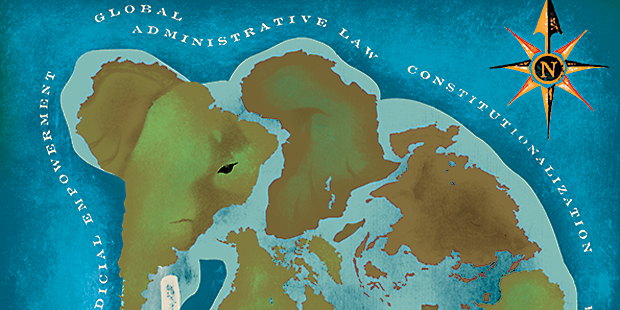
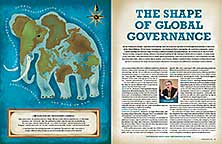
 Multimedia
Multimedia